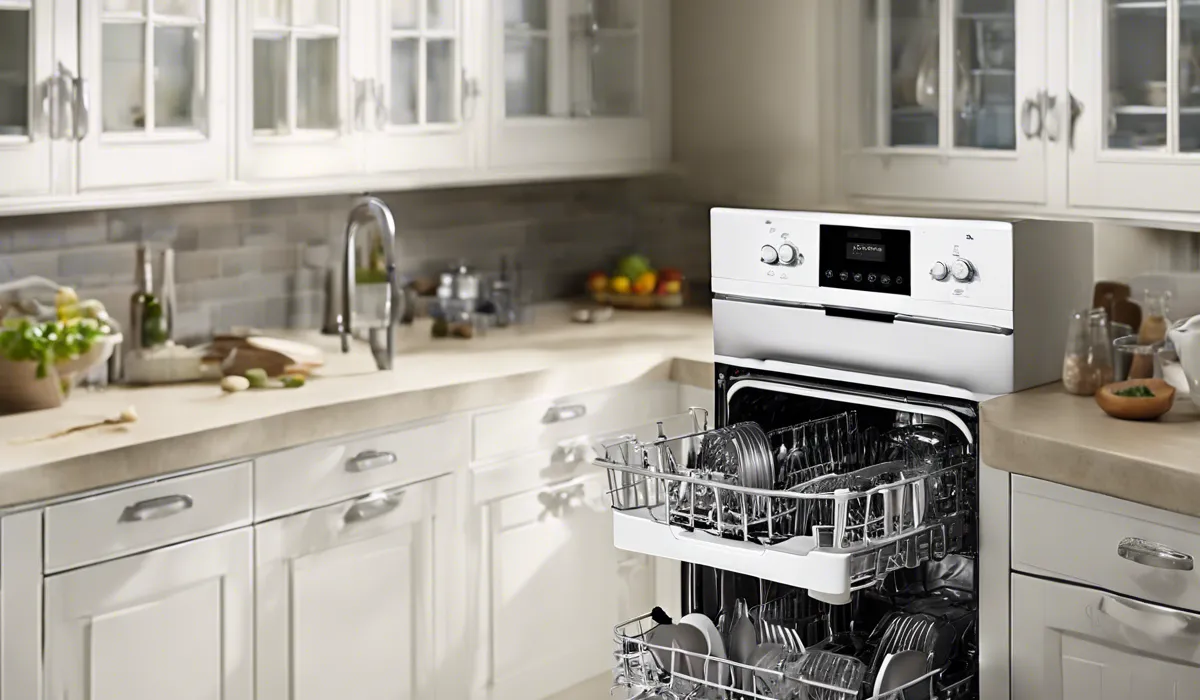What to Replace Dishwasher With: Top 5 Space-Saving Ideas
To replace a dishwasher, consider installing a new energy-efficient model, a drawer dishwasher for small spaces, or a portable dishwasher if you lack permanent space. For non-machine alternatives, a double-basin sink or a countertop dishwasher can suffice.
Benefits and Drawbacks of Dishwasher Alternatives

Environmental Impact of Dishwashers
Dishwashers are commonly found in modern homes, but their environmental impact is a growing concern.
On the one hand, they offer convenience and sanitation; on the other, they consume electricity and water, and their manufacturing and disposal contribute to environmental degradation.
The energy used to run a dishwasher often comes from fossil fuels, leading to carbon emissions unless the household is powered by renewable energy.
Moreover, the production of dishwashers involves the use of metals, plastics, and electronic components, which have their own ecological footprints.
Economic Considerations of Using Dishwashers
Economically speaking, while dishwashers can be a significant upfront investment, they may save time and potentially reduce water bills compared to manual washing if used efficiently.
However, the cost of repairs, maintenance, and eventual replacement must also be factored into the long-term economic impact of owning a dishwasher.
Pros and Cons of Dishwasher Alternatives
Alternatives to traditional dishwashers, such as manual washing or portable units, come with their own set of pros and cons.
Manual dishwashing can be more water-efficient, particularly if done correctly, but may be seen as less convenient.
Portable dishwashers offer flexibility and can be stored away when not in use, but they may not accommodate as many dishes and could be less energy-efficient than built-in models.
Water Usage and Efficiency Comparisons
When considering water usage, it’s crucial to compare the efficiency of dishwashers with their alternatives.
Modern dishwashers are designed to be water-efficient, using less water than manual washing if full loads are washed.
However, for smaller loads or infrequent use, alternatives like manual washing in a sink or using a compact dishwasher could be more efficient and environmentally friendly.
Types of Dishwasher Alternatives

Manual Dishwashing Techniques
For those opting for manual dishwashing, various techniques can maximize efficiency.
Filling one basin of the sink with soapy water for washing and the other with clean water for rinsing can save water compared to letting the faucet run.
Scraping off food debris before washing and using a high-efficiency detergent can also improve cleaning and reduce waste.
Features of Portable Countertop Dishwashers
Portable countertop dishwashers are an excellent option for households with limited space. They can sit on the countertop and connect temporarily to the kitchen faucet.
While they typically hold fewer dishes than full-size models, they are perfect for singles or couples and can be an efficient choice when used for full loads.
Compact Dishwashers for Small Spaces
Compact dishwashers are slightly larger than countertop models but smaller than standard dishwashers.
They are designed to fit into small kitchens without sacrificing too much on capacity. Some compact dishwashers can be built into cabinetry, offering a more permanent solution without the bulk of a full-size machine.
Dishwasher Drawers in Modern Kitchens
Dishwasher drawers are innovative alternatives that fit into kitchen cabinetry like a standard drawer. They are ideal for small loads and can be very energy and water-efficient.
These drawers can be installed at a convenient height, making them ergonomically friendly, and they often come with high-end features found in larger models.
Choosing the Right Alternative for Your Home

Assessing Kitchen Space and Household Needs
When considering dishwasher alternatives, evaluate the available kitchen space and your household’s needs. For smaller kitchens, a compact dishwasher or dishwasher drawer may be the best option.
If you live alone or with a partner, a countertop dishwasher could suffice. For larger families or frequent entertainers, a full-size energy-efficient model may be necessary.
Energy and Water Consumption Factors
Energy and water consumption are critical factors in choosing the right dishwasher alternative. Look for models with high energy ratings and low water usage to minimize environmental impact and save on utility bills.
This is especially important if you are replacing an older model dishwasher with a new, more efficient one.
Budget and Cost-Effectiveness
Consider your budget and the long-term cost-effectiveness of the dishwasher alternative you choose. While manual dishwashing has minimal upfront costs, it requires more of your time.
Compact and portable dishwashers might have lower initial costs than full-size models, but ensure that the operating costs align with your budget.
Sustainability and Ease of Use
Long-term sustainability and ease of use should guide your decision. An appliance that is durable and easy to maintain can provide value over time.
Consider how simple the alternative is to use daily and whether it fits into your lifestyle.
For example, a dishwasher drawer might be easier to load and unload than a portable unit that needs to be connected each time it is used.
FAQs About Dishwasher Replacement Options
What energy-efficient model should I consider when replacing my dishwasher?
When replacing your dishwasher with an energy-efficient model, look for one that has an Energy Star rating, which will save on energy and water usage over time.
What is a drawer dishwasher and when should I use one?
A drawer dishwasher is a compact, pull-out dishwasher suitable for small kitchens or limited spaces and is ideal when you have smaller loads of dishes to clean.
Is a portable dishwasher a good alternative to a traditional dishwasher?
Yes, a portable dishwasher is a great alternative if you lack a permanent space for installation, as it can be connected to a faucet when needed and stored away when not in use.
Can a double-basin sink be a substitute for a dishwasher?
A double-basin sink can serve as a non-machine alternative for hand-washing dishes, with one side for washing and the other for rinsing, although it is more labor-intensive than using a machine.
What is a countertop dishwasher and how does it function?
A countertop dishwasher is a compact unit that sits on the counter and usually connects to the kitchen faucet, making it suitable for small households or apartments without space for a full-sized model.
Final Thoughts
When replacing a dishwasher, choosing an energy-efficient model can offer long-term savings.
Drawer dishwashers are ideal for compact areas, while portable dishwashers suit those without fixed space. Alternatively, a double-basin sink or countertop dishwasher provides practical non-machine options for cleaning dishes efficiently.
Useful Resources
- https://www.energystar.gov/products/dishwashers
- https://www.stpaul.gov/departments/safety-inspections/building-and-construction/construction-permits-and-inspections/plumbing-gas
- https://www2.minneapolismn.gov/business-services/licenses-permits-inspections/construction-permits-certificates/mdr-permits/plumbing-permits/





